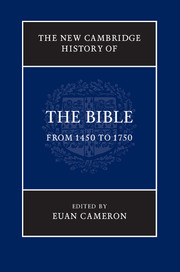Book contents
- Frontmatter
- Contents
- List of figures
- List of contributors
- Preface
- List of abbreviations
- Introduction
- PART I RETRIEVING AND EDITING THE TEXT IN EARLY MODERN EUROPE
- PART II PRODUCING AND DISSEMINATING THE BIBLE IN TRANSLATION
- 7 Publishing in print: Technology and trade
- 8 Latin Bibles in the early modern period
- 9 The Luther Bible
- 10 Bibles in the Dutch and Scandinavian vernaculars to c. 1750
- 11 German Bibles outside the Lutheran movement
- 12 Bibles in French from 1520 to 1750
- 13 English Bibles from c. 1520 to c. 1750
- 14 Bibles in Central and Eastern European vernaculars to c. 1750
- 15 Bibles in Italian and Spanish
- PART III PROCESSING THE BIBLE: COMMENTARY, CATECHESIS, LITURGY
- PART IV THE BIBLE IN THE BROADER CULTURE
- PART V BEYOND EUROPE
- Afterword
- Select bibliography
- Select Bible bibliography
- Index
8 - Latin Bibles in the early modern period
from PART II - PRODUCING AND DISSEMINATING THE BIBLE IN TRANSLATION
Published online by Cambridge University Press: 05 August 2016
- Frontmatter
- Contents
- List of figures
- List of contributors
- Preface
- List of abbreviations
- Introduction
- PART I RETRIEVING AND EDITING THE TEXT IN EARLY MODERN EUROPE
- PART II PRODUCING AND DISSEMINATING THE BIBLE IN TRANSLATION
- 7 Publishing in print: Technology and trade
- 8 Latin Bibles in the early modern period
- 9 The Luther Bible
- 10 Bibles in the Dutch and Scandinavian vernaculars to c. 1750
- 11 German Bibles outside the Lutheran movement
- 12 Bibles in French from 1520 to 1750
- 13 English Bibles from c. 1520 to c. 1750
- 14 Bibles in Central and Eastern European vernaculars to c. 1750
- 15 Bibles in Italian and Spanish
- PART III PROCESSING THE BIBLE: COMMENTARY, CATECHESIS, LITURGY
- PART IV THE BIBLE IN THE BROADER CULTURE
- PART V BEYOND EUROPE
- Afterword
- Select bibliography
- Select Bible bibliography
- Index
Summary
The Latin Bible occupies a paradoxical space in the history of the Bible in the early modern period in Europe. On one hand, all scholars from the sixteenth century onwards were acutely aware that the Latin Bible was a translation; it was not the authentic text, the fons et origo, for any of the biblical books. On the other hand, it was certainly not a translation like any other. Latin occupied a unique place in the culture of Europe. Until at least around 1700, while Latin had long since ceased to be the living language of a people, it remained the shared vehicle for scholarly communication across the Latin churches – including those that became reformed – and those regions where the Roman alphabet prevailed. Scholars of only modest education would at least be able to read Latin. Consequently, the faithful of Europe had a stake in the Latin Bible which vastly exceeded the level of interest in Bibles in any one regional vernacular. Latin translations could expect to be used – and to be criticised – on an international scale.
Moreover, though not original, the Latin Bible was an ancient text. More than a thousand years of exegesis, glossing and theology had grown from its words, often quite literally interpreted, as though it were no translation at all. That carapace of interpretation loaded the most commonly received translation, the Latin Vulgate, with some of the authority and responsibility of a sacred text. In the course of the sixteenth century the Roman Catholic Church would canonise this special status of the Vulgate for centuries to come. Consequently, and uniquely of all the translations to be discussed in this section, the Latin Vulgate experienced two kinds of scholarly attention at the same time. On one hand, as an ancient text it called for textual editing: biblical scholars aimed to retrieve it in its most authentic, original form (however that was conceived). In effect, the Vulgate underwent textual criticism and recovery in a way quite analogous to the scriptural texts in their original languages, or indeed to the sources of classical literature where textual criticism had first begun. A ‘corrected’ Vulgate became an objective of scholarly endeavour in itself.
- Type
- Chapter
- Information
- The New Cambridge History of the Bible , pp. 187 - 216Publisher: Cambridge University PressPrint publication year: 2016
- 4
- Cited by



